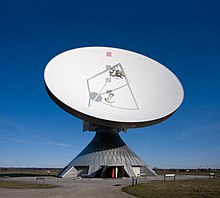Telecommunication
electronic transmission of information between locations
(Redirected from Telecom)
Telecommunication occurs when the exchange of information between two entities (communication) includes the use of technology.


Quotes
edit- The theory of communication is partly concerned with the measurement of information content of signals, as their essential property in the establishment of communication links. But the information content of signals is not to be regarded as a commodity; it is more a property or potential of the signals, and as a concept it is closely related to the idea of selection, or discrimination. This mathematical theory first arose in telegraphy and telephony, being developed for the purpose of measuring the information content of telecommunication signals. It concerned only the signals themselves as transmitted along wires, or broadcast through the aether, and is quite abstracted from all questions of "meaning." Nor does it concern the importance, the value, or truth to any particular person. As a theory, it lies at the syntactic level of sign theory and is abstracted from the semantic and pragmatic levels. We shall argue … that, though the theory does not directly involve biological elements, it is nevertheless quite basic to the study of human communication — basic but insufficient.
- Colin Cherry (1957)On Human Communication. p. 10
- In August 1858 President Buchanan exchanged greetings with Queen Victoria by means of the newly completed Atlantic cable. Commemorating that happy occasion, it is a pleasure to send best wishes to you on the one hundredth anniversary of the completion of the first Trans-Atlantic Cable. The development of international communications has brought the peoples of the world into close neighborhood. It is our hope that these means of communication will serve increasingly as a carrier of the message of peace for which we both work and pray.
- Dwight D. Eisenhower; Exchange of Messages Between the President and Her Majesty Queen Elizabeth II on the 100th Anniversary of the Trans-Atlantic Cable, The American Presidency Project; 18 August 1958
- Advances in the technology of telecommunications have proved an unambiguous threat to totalitarian regimes everywhere.
- Rupert Murdoch (1993), cited in: Stephen Kotkin "Murdoch Got Lost in China." New York Times, May 4, 2008
- We need to recognise that the entire information sector—from music to newspapers to telecoms to internet to semiconductors and anything in-between—has become subject to a gigantic market failure in slow motion. A market failure exists when market prices cannot reach a self-sustaining equilibrium. The market failure of the entire information sector is one of the fundamental trends of our time, with far-reaching long-term effects, and it is happening right in front of our eyes.
- Eli Noam in: "Eli Noam: Market failure in the media sector" at news.ft.com, February 16 2004
- Telecom was the golden goose which laid the golden egg. The Supreme Court ensured that the golden goose will never lay golden egg again for a little while.
- Kapil Sibal On the Supreme Court's decision to cancel 2G spectrum licences, as quoted in Telecom sector not to lay 'golden egg' for a while, thanks to Supreme Court: Kapil Sibal, The Economic Times (3 April 2013)
- In the past, documentation has frequently been compared with librarianship, with some argument as to which comprehends the other. The field is more helpfully characterised if we take its scope to be all forms of document (i.e. any physical carrier of symbolic messages) and all aspects of their handling, from production to delivery. The document system then becomes very much wider than conventional librarianship – it includes publication and printing, distribution, some forms of telecommunication, analysis, storage, retrieval and delivery to the user.
- Brian Campbell Vickery, Concepts of documentation (1978), p. 279
- Information systems, at any level of complexity above that of speech, necessarily involve technologies such as printing, telecommunications, or computers. However, to information science technical potentialities and constraints are of importance mainly in that they affect the social relations concerned.
- Brian Campbell Vickery, Information Science in Theory and Practice (1987) p. 14.